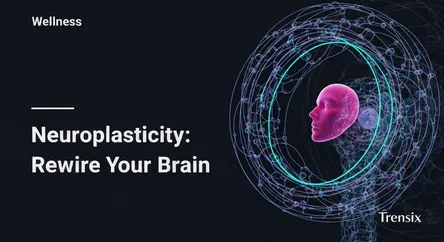Wellness
Neuroplasticity: Rewire Your Brain

Discover neuroplasticity, the brain's amazing ability to change and adapt. Learn how you can harness it to improve learning, wellness, and resilience.
What is it?
Neuroplasticity, also known as brain plasticity, is the brain's remarkable ability to reorganize itself by forming new neural connections throughout life. For a long time, scientists believed the brain was a static organ that stopped changing after childhood. However, research now shows it is highly malleable, constantly adapting to new experiences, learning, and even injury. This process involves creating new pathways and strengthening or weakening existing ones, effectively "rewiring" its own structure and function. There are two main types: structural plasticity, where the brain's physical structure changes, and functional plasticity, where it shifts functions from a damaged area to an undamaged one.
Why is it trending?
The concept of neuroplasticity has gained massive popularity because it puts the power of change in our hands. The growing understanding that we can actively influence our brain's development at any age is empowering. It is a cornerstone of the modern wellness and mindfulness movement, offering a scientific basis for practices like meditation and cognitive therapies. This shift from a fixed mindset to a growth mindset about our own cognitive abilities has made neuroplasticity a mainstream topic, promising tangible ways to improve mental health, learning, and overall brain performance.
How does it affect people?
Neuroplasticity is fundamental to our daily lives; it's how we learn new skills, create memories, and overcome bad habits. Harnessing this ability can lead to enhanced cognitive functions, improved resilience against stress, and recovery from brain injuries like strokes. People can actively encourage positive brain changes through activities such as regular exercise, learning a new language or instrument, practicing mindfulness, and ensuring quality sleep. This empowers individuals to take control of their mental well-being, change unhelpful thought patterns, and maintain cognitive health throughout their lives.